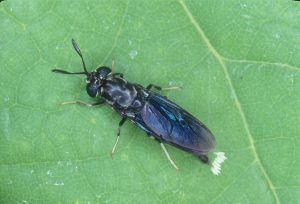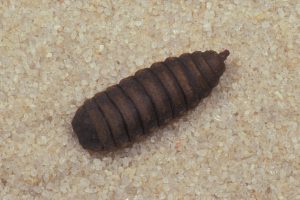
Sometimes the backbone-less residents of compost piles are strange and unnerving. However, many invertebrates that work and live in our compost bins are necessary and beneficial to the bottom-line of well-done compost. Besides things like worms, millipedes, springtails, and earwigs, consider the soldier fly. This robust, almost wasp-looking fly produces larvae that are often found in compost heaps to the benefit of the gardener. Sort of creepy, the black soldier fly is a definite contributor to the ultimate composting goal – stable, earthy-smelling organic matter.
If you saw adult soldier flies, you might take a step back and think they were wasps just short of an inch long. Black in color with dark, somewhat metallic-blue wings and white-tipped legs, these soldier flies’ frequent sites that offer moist organic matter of either animal or plant origin. Besides agricultural areas where soldier flies might encounter manure, they will also seek out compost heaps in residential areas. A female soldier fly can lay about five-hundred eggs during her lifetime. The eggs hatch in about four days and the resulting larvae begin to go to work on the organic matter. The larvae eventually grow to a little over one inch in size during the next fourteen days. Light brown in color, the larvae are heavily segmented almost giving them a plated or armored appearance. The pupal stage of this fly is dark brown in color and also appears segmented or plated.

Besides working through your compost pile and turning it into great organic matter, soldier flies are being looked at as recyclers of livestock waste where they transform it into useful organic fertilizer. Additionally, the resulting larvae can be used as high-quality feed for fish and other animals. Soldier flies are truly the workhorses in the compost arena.
I often find soldier flies in my compost pile. So, if you see a soldier fly or find some of their larvae wiggling through your compost, take heart – they are just doing their job! There is nothing disgusting or grotesque about them – they are simply curators of your compost and are working for free! For information on all types of topics related to composting, or to ask a question, you can also call the Master Gardener Volunteer Helpdesk on Mondays, Wednesdays, and Fridays from 1 to 4 pm at 764-4340 for gardening help and insight into their role as an Extension volunteer. Ralph E. Mitchell is the Director/Horticulture Agent for UF/IFAS Extension – Charlotte County. He can be reached at 941-764-4344 or ralph.mitchell@charlottecountyfl.gov . Connect with us on social media. Like us on Facebook @CharlotteCountyExtension and follow us on Instagram @ifascharco.
Resource:
Diclaro II, J. W. & Kaufman, P. E. (2018) Black soldier fly. The University of Florida Extension Service, IFAS – Featured Creatures.
 2
2
